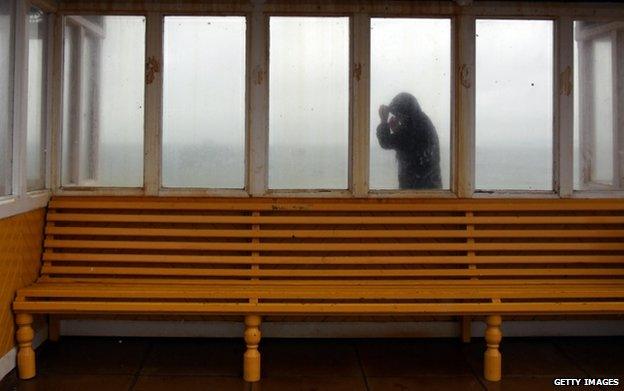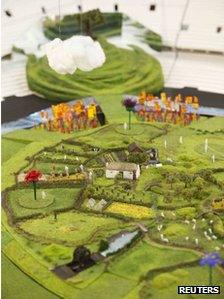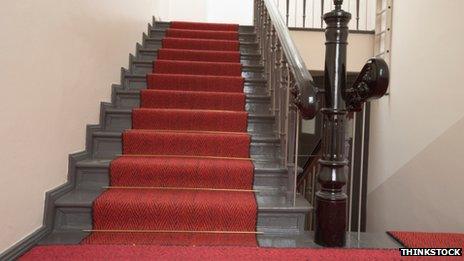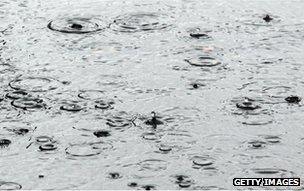Fifty words for rain
- Published
- comments

If the Inuit apocryphally have 50 words for snow, why don't British people have 50 words for rain... or at least more words than the few they normally employ, asks Kevin Connolly.
As the UK splashes and squelches its way through what's turning into the wettest June on record, the most surprising news of the summer is the inclusion of fake clouds in the elaborate plans for the Olympic opening ceremony.
The bucolic idyll just wouldn't be complete without Maypole dancers and sturdy ploughmen of course; perhaps we will even hear the fractious shouts of angry travellers and bailiffs as a mock-eviction is conducted, or the nagging whine of an uninsured moped.
And somewhere above it will hover imagineered clouds - the message to the world, presumably, is that we can take a joke about our weather. And if providence chooses not to rain on our parade, then we'll rain on our own for the hell of it.
It just goes to show you how deeply the very thought of rain is woven into the experience of being British.
And yet our official lexicon of rainfall is woefully buttoned-up and limited.
The Met Office talks simply of light, moderate and severe downfalls. That's rather disappointing when you consider the poetry of the <link> <caption>Beaufort Scale for measuring wind</caption> <altText>Met Office</altText> <url href="http://www.metoffice.gov.uk/weather/marine/guide/beaufortscale.html" platform="highweb"/> </link> , with its evocative talk of <link> <caption>smoke rising vertically on a calm day</caption> <url href="http://www.mountwashington.org/education/center/arcade/wind/beaufort.html" platform="highweb"/> </link> , and then goes on to describe singing sounds from telegraph wires and the difficulty of walking upright as breezes intensify into gales.
After all, if it's really true that the Inuit have 50 words for snow on the basis that they see enough of the stuff to chart its infinite variety, then surely in the UK we ought to have 50 words for rain.
There's drizzle of course - although I'm not sure that's an officially recognised term - but not much beyond that until you get to deluge (which is French) and downpour (which is dull).
I turn to the linguist Geoff Pullum from Edinburgh University for an explanation as to why the English language appears to lag behind Inuit in the richness and sophistication with which it describes the weather.

Will fake clouds really be needed at the opening ceremony?
Even over the phone, I can almost hear his eyes rolling with despair.
No, he says patiently, Inuit languages do NOT have 50 words for snow. They don't have them because they don't need them. So it follows that we don't need 50 words for rain from a linguistic perspective.
Yes, he agrees, he has been asked this question many times before.
"I have long experience in this depressing sub-area," Pullum tells me. "The idea is neither empirically true nor practically necessary.
"There's a screwiness to the logic here [of having 50 words for snow]. As humans we experience lots of variety in everyday life but we don't try to bring it under linguistic observation. It's just observably not what we do."
To re-enforce his point, Pullum offers the examples of surfers who spend their lives thinking about surf. It looms large in their imaginations, they think about it and talk about it all the time and its capacity for infinite subtleties. And yet they're quite content to have a single word for it. Surf.
Still when we posed the question to the Broadcasting House audience on Radio 4 we were deluged, inundated and flooded with suggestions for words for rain.
One heartening conclusion is that colloquial English is a lot more vibrant, colourful and expressive than its slightly grander cousin deployed in the Met Office.
Weatherman Matt Taylor uses listeners' suggestions for alternative terms for rain.
Many colloquial words for rain are regional or have their roots in the Celtic nations, such as <bold>dreich</bold> in Scots English and <bold>soft weather</bold> in the euphemism-laden Hiberno-English spoken in Ireland.
There are plenty I'd like to hear weather forecasters using on the air:
<bold>tippling down</bold>
<bold>pelting down</bold>
<bold>raining cats and dogs</bold>
And there are more with the sturdy feel of regional English. <bold>Luttering down</bold>, <bold>siling down</bold> and <bold>plothering down</bold> are among my favourites. You can't honestly put them in order of severity, of course, but all conjure that sense of looking out of the window on a rainy day somewhere in provincial Britain and seeing rain hammering relentlessly from a sky the colour of cigarette ash.
One of the commonest and most vividly descriptive phrases is <bold>raining stair-rods</bold>. I like it because I shouldn't think many people in the UK have seen a stair-rod for 50 years or more so it has the comfortable feeling of a phrase your mother or father might have used to describe the rain.
The analogy, of course, is the rain falling in long, straight streaks - both German and French have words using the imagery of ropes or cords to do the same thing.

It also strikes me as being a slightly more useful point of comparison than another phrase we were offered - <bold>raining chair-legs</bold>.
Perhaps surprisingly, the most graphic of the terms comes from French - a phrase which says simply it's <bold>raining like a cow relieving itself</bold>, which conjures an unpalatable but graphic image of force and abundance.

Parts of the UK have had a very wet hosepipe ban
And why don't these phrases find their way into the lexicon of TV weather forecasting? Perhaps it's because we're rather a buttoned-up audience and we still crave a little formality on TV and radio.
BBC weather forecaster Matt Taylor says there is no style guide for talking about the weather.
"There's no big book of words you shouldn't use, so I think there's a bit of self-censorship there - sometimes you do want to say that it's going to be <bold>chucking it down</bold> out there. But of course there are a lot of colloquialisms here so there's also the point of whether people will really know exactly what you mean."
None of us - with the possible exception of Taylor and his fellow meteorologists - knows exactly what the weather will be doing when the Olympics opening ceremony finally gets under way next month.
But when that fake cloud splutters into life and rain begins to fall on the green and pleasant land below, it's a pleasure to think that all over the UK, families will have a rich and varied vocabulary to call on when it comes to describing it.
<italic>Broadcasting House is on BBC Radio 4 at 09:00 BST on Sundays, or </italic> <link> <caption>listen again via iPlayer</caption> <altText>BH</altText> <url href="http://www.bbc.co.uk/programmes/b006qnj3" platform="highweb"/> </link>
- Published18 June 2012